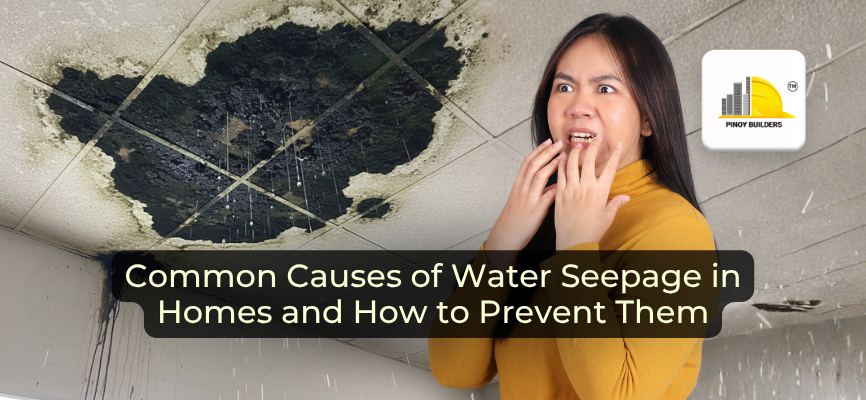Due to the rainy season in the Philippines, managing a safe and dry household is essential. Water seepage in homes is a common issue, but this problem is heightened during the rainy season in the country due to heavy rainfalls and the heightened risk of potential flooding. Not only can heavy rain cause blockage in a home’s drainage system, but a blocked drainage system can also cause flooding, which can cause water seeping into the home. Without proper drainage and plumbing system, this can be a vicious cycle that can come at the cost of your home’s safety and overall structure.
Cause And Prevention Of Water Seepage In Homes

Image from Waterproofing Specialist
A cracked foundation, corrosion in old and unkept plumbing systems, and even accidentally loosened water or pipe heads can all cause water to seep into the home. This can lead to major damage to the home’s structure and take a toll on your repair, water, and energy bills. During the rainy season, it is important to take steps to prevent water from seeping into your home. In this article, we will discuss some of the most common causes of water seepage in homes and what you can do to stop it.
Corroded Plumbing System
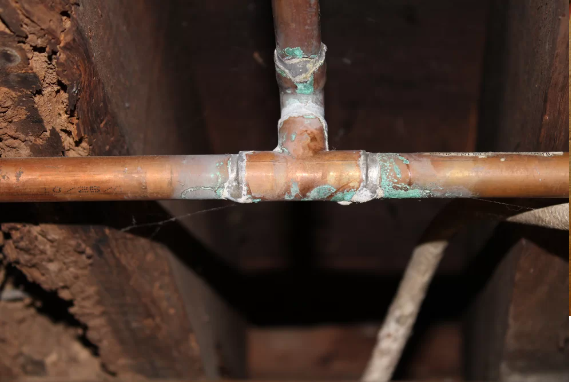
Image from Fischer Plumbing
A corroded plumbing system can cause significant water seepage into homes and increase the risk of a damaged structure. Corrosion in the plumbing system is entirely normal, but it can be accelerated by a few issues in your home’s water system. Leaking pipes, or issues with the pipe joints can cause your plumbing system to easily corrode. In addition, using poor-quality materials in your plumbing system will increase the likelihood of your plumbing system easily rusting and resulting in water seepage.
How To Prevent Water Seepage Due To Corroded Plumbing System
The most effective way to prevent water from seeping into your home due to an issue with your plumbing system is to ensure that you are using durable materials in the plumbing system. The plumbing system is an essential component of a functional household, which is why this part of the home should not be subject to cutting corners and a tight budget. Some leakage in the plumbing system might be too small to notice at first, making it hard to know if there is an issue. A good solution to this is to schedule regular maintenance with plumbing professionals to ensure that your home is safe from water seepage.
Clogged Gutters And/Or Downspouts
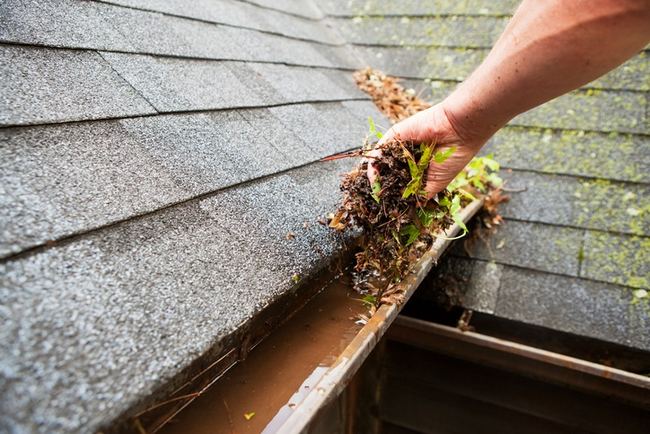
Clogged gutters and downspouts can lead to water seepage in homes from overflowing water that may have carried leaves and other debris, accumulation of moisture encouraging mold and mildew growth inside the pipes, and even a weakened foundation due to the structure’s age.
How To Prevent Water Seepage Due To Clogged Gutters And/Or Downspouts
Gutters and downspouts will get clogged once in a while, which is why it is essential to clean and practice maintenance at least twice a year, and even more if the rainy season brought on particularly strong rain and wind. Using detachable gutter filters can be useful as well since they can easily filter out the debris and prevent them from entering and clogging up the gutter of the downspout attached to it.
Damaged Drainage
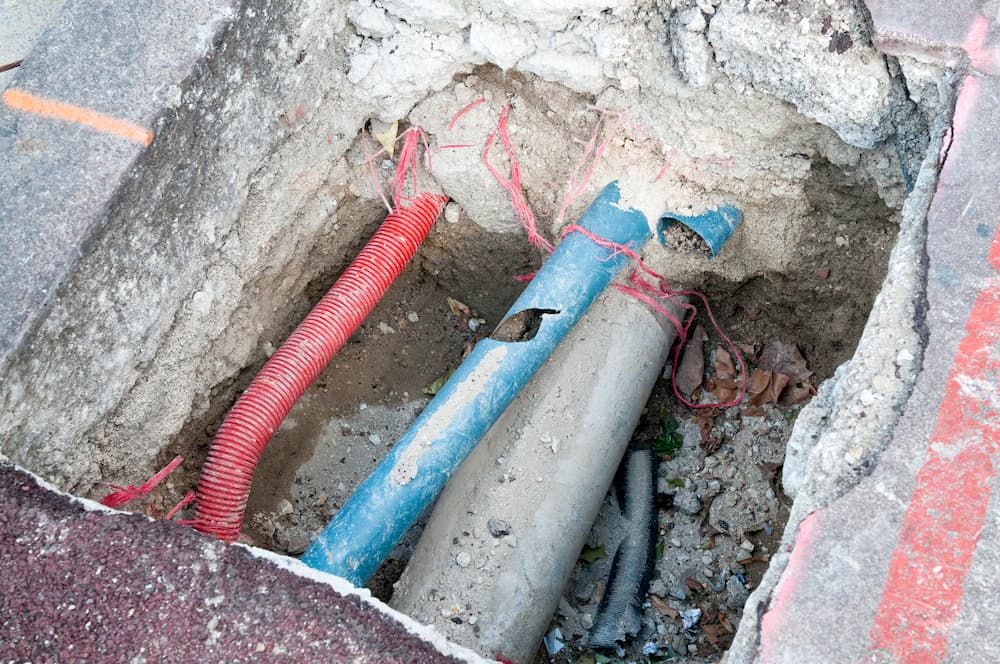
Image from Express Drainage Survey
Related to a corroded plumbing system, a damaged drainage system can cause water to seep into your home and even damage the very foundation of the structure. Cracked or broken drainage pipes that lead away from the home can cause the leaking water to saturate the soil around the structure of your home and cause the water to essentially push up and into the basement of the home.
How To Prevent Water Seepage Due To Damaged Drainage
Just like maintaining the plumbing system, your home’s drainage system should be regularly inspected and maintained. This includes many components of the home, such as the gutters, downspouts, drain pipes, and sump pumps for homes with crawl spaces. Since water seepage from damaged drainage might not always be as obvious, especially if the damage is still small, it is important that regular inspection is done to provide prompt repairs to prevent the damage from extending to the home’s interior and structural foundation.
Toilet/Shower Head/Water Faucet Leaks
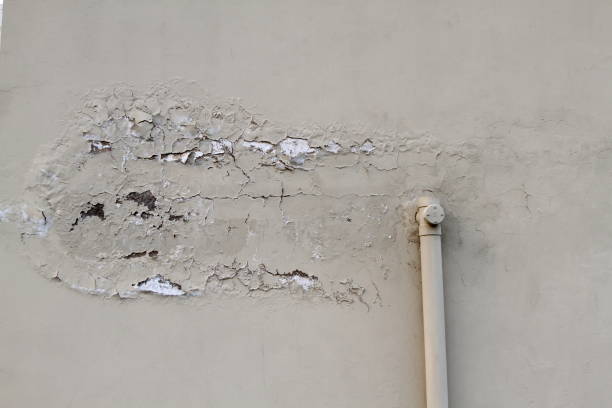
Poor grout often caused the toilet, shower head, and faucet leaks or caulking application or damage to the pipes. If the leaks persist, it can slowly seep into the nearby walls, floors, and ceilings and cause significant damage to the interior and integrity of the home’s structure. Sometimes, a malfunctioning toilet or drainage system in sinks or bathrooms can cause backflow or overflow, which can then lead to water seeping into the rooms adjacent to the leak.
How To Prevent Water Seepage Due To Toilet/Shower Head/Water Faucet Leaks
Apart from regular inspection, water seepage due to the toilet, shower head, and faucet leaks can be fixed by proper reapplication of waterproofing sealants and the reapplication of grout or caulk when necessary. The repair or replacement of malfunctioning toilets or other parts connected to the leaking drainage system should also be done to prevent water from seeping into the home again.
Sealing Leaks For A Safer Home
Without a doubt, making sure that your home is leakproof is essential for the safety and comfort of everyone inside your home. Apart from the usual leaking roof, there are other reasons why water may be seeping into our home. By detecting the issue and executing the proper repairs, you can ensure that your home is safe during the rainy season.
References:
- The 71 Percent. (n.d.). Most Common Causes of Water Leaks in Homes. The 71 Percent. Retrieved August 4, 2023, from https://www.the71percent.org/common-causes-of-water-leaks/
- HELP Plumbing, Heating, Cooling and Drains. (2021, January 18). 8 Common Causes Of Household Water Leaks. HELP Plumbing, Heating, Cooling and Drains. Retrieved August 4, 2023, from https://333help.com/blog/common-water-leak-causes/


